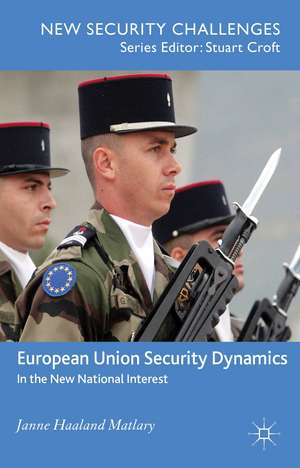European Union Security Dynamics: In the New National Interest: New Security Challenges
Autor J. Matlaryen Limba Engleză Paperback – 22 ian 2013
| Toate formatele și edițiile | Preț | Express |
|---|---|---|
| Paperback (2) | 382.95 lei 6-8 săpt. | |
| Palgrave Macmillan UK – 29 ian 2009 | 382.95 lei 6-8 săpt. | |
| Palgrave Macmillan UK – 22 ian 2013 | 383.93 lei 6-8 săpt. | |
| Hardback (1) | 388.72 lei 6-8 săpt. | |
| Palgrave Macmillan UK – 29 ian 2009 | 388.72 lei 6-8 săpt. |
Din seria New Security Challenges
- 9%
 Preț: 763.33 lei
Preț: 763.33 lei -
 Preț: 390.63 lei
Preț: 390.63 lei - 15%
 Preț: 636.94 lei
Preț: 636.94 lei - 15%
 Preț: 580.68 lei
Preț: 580.68 lei -
 Preț: 381.59 lei
Preț: 381.59 lei - 15%
 Preț: 644.95 lei
Preț: 644.95 lei -
 Preț: 386.61 lei
Preț: 386.61 lei -
 Preț: 391.61 lei
Preț: 391.61 lei -
 Preț: 385.84 lei
Preț: 385.84 lei -
 Preț: 389.88 lei
Preț: 389.88 lei -
 Preț: 428.07 lei
Preț: 428.07 lei - 15%
 Preț: 649.06 lei
Preț: 649.06 lei -
 Preț: 383.93 lei
Preț: 383.93 lei -
 Preț: 390.63 lei
Preț: 390.63 lei -
 Preț: 388.13 lei
Preț: 388.13 lei -
 Preț: 382.18 lei
Preț: 382.18 lei -
 Preț: 392.60 lei
Preț: 392.60 lei -
 Preț: 388.72 lei
Preț: 388.72 lei -
 Preț: 387.38 lei
Preț: 387.38 lei - 15%
 Preț: 695.70 lei
Preț: 695.70 lei - 15%
 Preț: 584.43 lei
Preț: 584.43 lei -
 Preț: 384.86 lei
Preț: 384.86 lei -
 Preț: 388.52 lei
Preț: 388.52 lei - 15%
 Preț: 699.77 lei
Preț: 699.77 lei - 18%
 Preț: 726.37 lei
Preț: 726.37 lei -
 Preț: 384.09 lei
Preț: 384.09 lei -
 Preț: 388.13 lei
Preț: 388.13 lei -
 Preț: 385.47 lei
Preț: 385.47 lei - 15%
 Preț: 640.88 lei
Preț: 640.88 lei -
 Preț: 385.84 lei
Preț: 385.84 lei -
 Preț: 383.93 lei
Preț: 383.93 lei -
 Preț: 382.75 lei
Preț: 382.75 lei -
 Preț: 389.70 lei
Preț: 389.70 lei - 15%
 Preț: 697.97 lei
Preț: 697.97 lei -
 Preț: 382.95 lei
Preț: 382.95 lei -
 Preț: 387.38 lei
Preț: 387.38 lei
Preț: 383.93 lei
Nou
Puncte Express: 576
Preț estimativ în valută:
73.47€ • 76.42$ • 60.66£
73.47€ • 76.42$ • 60.66£
Carte tipărită la comandă
Livrare economică 14-28 aprilie
Preluare comenzi: 021 569.72.76
Specificații
ISBN-13: 9781137307620
ISBN-10: 1137307625
Pagini: 234
Ilustrații: XIII, 234 p. 1 illus.
Dimensiuni: 140 x 216 x 18 mm
Greutate: 0.32 kg
Ediția:2009
Editura: Palgrave Macmillan UK
Colecția Palgrave Macmillan
Seria New Security Challenges
Locul publicării:London, United Kingdom
ISBN-10: 1137307625
Pagini: 234
Ilustrații: XIII, 234 p. 1 illus.
Dimensiuni: 140 x 216 x 18 mm
Greutate: 0.32 kg
Ediția:2009
Editura: Palgrave Macmillan UK
Colecția Palgrave Macmillan
Seria New Security Challenges
Locul publicării:London, United Kingdom
Cuprins
Introduction PART I: SECURITY POLICY IN EUROPE Post-National Security Policy in Europe EU Security and Defence Policy: Legitimacy and Capability EU Security Dynamics: The New National Interests PART II: EU SECURITY DYNAMICS: PURSUING NATIONAL INTERESTS Playing the Great Game: France, Britain, and Germany Playing the Two-Level Game: France, Britain, Germany PART III: INCURRING SECURITY POLICY DEPENDENCIES Coalitions of the Able: The Pooling of Military Capacity in the ESDP Coalitions of the Willing: The Pooling of Sovereignty in the ESDP
Recenzii
'Janne Matlary's book is an imaginative and penetrating study of the pivotal role of the French and British axis in EU security policy by one of Norway's most creative and thoughtful political analysts. This is a thoroughly thought provoking work.'
- Christopher Coker, Professor of International Relations, London School of Economics, UK
'This book is lucid and well-argued, and reminds us of the recently neglected influence of member states' national interests in the development of ESDP [...] Matlary's analysis is genuinely interesting for students of European studies and it would be essential reading in undergraduate and postgraduate courses of European integration.'
- Journal of Global Analysis
'It's always a pleasure to welcome a book which profits from both academic analysis and professional practice. Janne Haaland Matlary, Professor of International Politics at the University of Oslo and former Deputy Foreign Minister of Norway, offers just this ideal synthesis [. . .] This book is a useful corrective to both lazy theorising about the socialisation of European elites and to an unthinking disregard of the EU as an international actor [. . .] In sum, it vividly illustrates why movement towards a more credible, effective and coherent foreign, security and defence policy on the part of the Union has been so qualified to date.'
- Ben Tonra, European Security
'Matlary convincingly reaffirms the findings of those who emphasise the paramount role that EU member states and their interests play in the development of ESDP. Even more importantly, she casts some light on the hitherto comparatively under-explored influence of EU member states' publics on European security and defence dynamics [...] The latter finding in particular makes Matlary's book highly relevant for the ongoing policy-oriented debates on how to bolster the EU's potential to become an international security and defence actor that punches at its weight.'
- Millennium, Journal of International Studies
- Christopher Coker, Professor of International Relations, London School of Economics, UK
'This book is lucid and well-argued, and reminds us of the recently neglected influence of member states' national interests in the development of ESDP [...] Matlary's analysis is genuinely interesting for students of European studies and it would be essential reading in undergraduate and postgraduate courses of European integration.'
- Journal of Global Analysis
'It's always a pleasure to welcome a book which profits from both academic analysis and professional practice. Janne Haaland Matlary, Professor of International Politics at the University of Oslo and former Deputy Foreign Minister of Norway, offers just this ideal synthesis [. . .] This book is a useful corrective to both lazy theorising about the socialisation of European elites and to an unthinking disregard of the EU as an international actor [. . .] In sum, it vividly illustrates why movement towards a more credible, effective and coherent foreign, security and defence policy on the part of the Union has been so qualified to date.'
- Ben Tonra, European Security
'Matlary convincingly reaffirms the findings of those who emphasise the paramount role that EU member states and their interests play in the development of ESDP. Even more importantly, she casts some light on the hitherto comparatively under-explored influence of EU member states' publics on European security and defence dynamics [...] The latter finding in particular makes Matlary's book highly relevant for the ongoing policy-oriented debates on how to bolster the EU's potential to become an international security and defence actor that punches at its weight.'
- Millennium, Journal of International Studies
Notă biografică
JANNE HAALAND MATLARY is Professor of International Politics at the University of Oslo and at the Norwegian Military Staff College, Norway. She has published widely in the field of European security policy, and is currently working on the political implications of asymmetric warfare in NATO. She was Deputy Foreign Minister of Norway, 1997-2000.


















